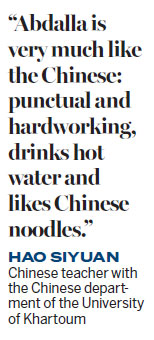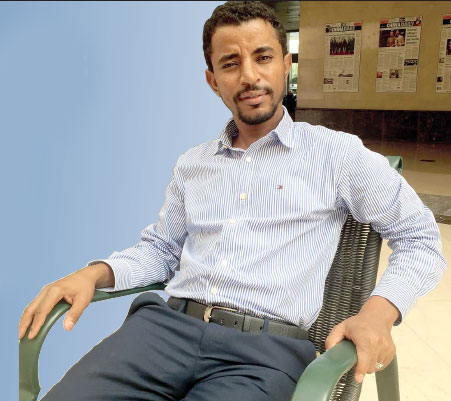China molds Sudanese man's life

Once a reluctant learner of Mandarin, Albadawe Abdalla has risen to head of the Chinese department at a top university
In 2004, 21-year-old Albadawe Abdalla was among 20 students who had enrolled in the Chinese program at the University of Khartoum, the top university in Sudan. But Abdalla had become frustrated because there were few opportunities to use the language in his country.
He had never even met a Chinese person.
| Albadawe Abdalla heads the Chinese department at the University of Khartoum, which has more than 300 students, the largest and the most popular department in the faculty of arts. Li Jing / China Daily |
"I wanted to transfer to an English major, which was the priority for most students in the faculty of arts," Abdalla recalls.
After a semester, he had begun to find the language and culture more appealing, and his decision to stick with it led him to study in China and choose the language as the focus of his career.
Now 33, Abdalla is head of the Chinese department at the university, which has more than 300 students, the largest and the most popular department in the faculty of arts.
"Each year, only those with the highest scores can be enrolled at the college," he says. "We will set up the curriculum for a master's degree soon."
The faculty at the department also has grown from one person in 2004 to more than 10, including some from China.
Hao Siyuan, a postgraduate student from Beijing Language and Culture University, has been a volunteer teacher in the department since 2015.
She says under Abdalla's leadership, the department has developed quickly. "His schedule is packed with meetings and assorted routine stuff, and he is also the most popular teacher in the department," Hao says.
"Abdalla is very much like the Chinese: punctual and hardworking, drinks hot water and likes Chinese noodles."
Chinese is now an engrained part of Abdalla's life, although learning the language started as a big challenge.
"It is the most difficult language because it is too difficult to remember," Abdalla says.

"I wrote and recited characters every day, but I found they were gone totally from my mind the second day," he recalls.
During his first semester, Abdalla spent all his spare time memorizing characters. "I went to the library first, early in the morning, and repeatedly practiced until the lights were turned off," he says.
A friend bought him a cassette of Chinese songs in China as a gift. "I still remember the lyrics," he says as he starts to croon - a hit Chinese song of the 1980s.
Back in the early 2000s, there were few materials for learning Chinese in Sudan, since the internet was not widely available and there were few Chinese there.
"One day I saw a Chinese person on the way back from school. I called to the bus driver to stop the bus and ran to stop the Chinese person's car and asked if I can speak Chinese with him," he recalls. "Friends called me insane. But I really enjoyed it and wanted to indulge in the culture."
In 2007, when Abdalla was in his third year of college, he got a chance to attend Beijing Jiaotong University in China as an exchange student.
"From that year on, I saw more job and study opportunities emerging in Sudan for Chinese majors," he says.
Before arriving, he was concerned about finding Muslim food, the colder climate and pollution in Beijing, but everything turned out fine, leading him to opt for further studies in China.
In 2008, he passed the necessary Chinese-language level tests and got a scholarship from the Chinese government to get his master's degree in teaching Chinese as a second language at Northwest Normal University in Lanzhou, capital of Gansu province.
He stayed in China for four years, which he says made him more Chinese. He is well-versed in using such tools as the Baidu search engine and listening to music with Chinese apps like QQ music and Youku video. He is also good at WeChat, a Chinese instant communication networking app and shares regular updates over it.
After graduation, he returned to his alma mater in Sudan as a Chinese teacher.
"We see him as a reliable friend and our older brother," says student Muhja Abdelgadir, a Chinese major. "He is very outgoing and amiable, likes encouraging us to set up targets and is always ready to help."
Abdelgadir says the most interesting part of his class is the riveting stories Abdalla tells about life in China.
"People in Sudan still know little about China and the Chinese, except for Chinese-made products, some of which are low quality," Abdalla says. "However, China is the largest trading partner of Sudan, and there is much more to learn about the country.
"Chinese culture is the most appealing in the world and also is the best key to learning the language and the country," he says.
Abdalla has been putting on open days at the department, at which students and faculty volunteers introduce China to the public, its history, literature and food.
"Each time, the event is packed with crowds, including some local government officials," he adds.
Working with the cultural office of the Chinese embassy in Sudan and the Confucius Institute at the University of Khartoum, the college also runs the Chinese Bridge Chinese Proficiency Competition for Foreign College Students and Chinese culture festivals.
"I hope the consistent support from the Chinese government will help get students to widen their mind and study abroad in China," he says.
Abdalla sees the language as a bridge to another culture. "In the past, we were limited to information in the English-language media. Now, with the language we can get to know the country on our own," he says. "I also want to start a column in the local newspaper to cover China, which now seldom makes headlines in local media."
Abdalla applied this year for a chance to return to China to further his Chinese studies through a doctoral degree.
"I hope to be back in Beijing soon, my favorite Chinese city," he says.
Contact the writers through lijing2009@chinadaily.com.cn
(China Daily Africa Weekly 08/19/2016 page19)
Today's Top News
- Foreign ministers of China, Egypt call for Gaza progress
- Shield machine achieves Yangtze tunnel milestone
- Expanding domestic demand a strategic move to sustain high-quality development
- Xi hears report from Macao SAR chief executive
- Xi hears report from HKSAR chief executive
- UN envoy calls on Japan to retract Taiwan comments































